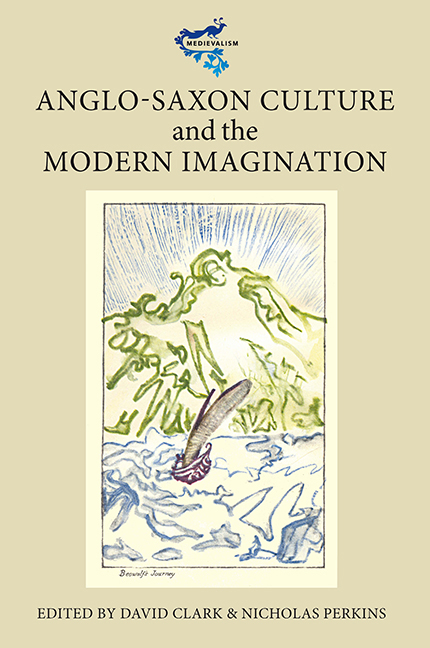Book contents
- Frontmatter
- Contents
- List of Illustrations
- Contributors
- Foreword
- Acknowledgements
- Abbreviations
- Introduction
- 1 From Heorot to Hollywood: Beowulf in its Third Millennium
- 2 Priming the Poets: The Making of Henry Sweet's Anglo-Saxon Reader
- 3 Owed to Both Sides: W.H. Auden's double debt to the literature of the North
- 4 Writing for an Anglo-Saxon Audience in the Twentieth Century: J.R.R. Tolkien's Old English Chronicles
- 5 ‘Wounded men and wounded trees’: David Jones and the Anglo-Saxon Culture Tangle
- 6 Basil Bunting, Briggflatts, Lindisfarne, and Anglo-Saxon Interlace
- 7 BOOO Seeing Beowulf in Pictures and Print
- 8 Window in the Wall: Looking for Grand Opera in John Gardner's Grendel
- 9 Re-placing Masculinity: The DC Comics Beowulf Series and its Context, 1975–6
- 10 P.D. James Reads Beowulf
- 11 Ban Welondes: Wayland Smith in Popular Culture
- 12 ‘Overlord of the M5’: The Superlative Structure of Sovereignty in Geoffrey Hill's Mercian Hymns
- 13 The Absent Anglo-Saxon Past in Ted Hughes's Elmet
- 14 Resurrecting Saxon Things: Peter Reading, ‘species decline’, and Old English Poetry
- Index
13 - The Absent Anglo-Saxon Past in Ted Hughes's Elmet
Published online by Cambridge University Press: 20 April 2017
- Frontmatter
- Contents
- List of Illustrations
- Contributors
- Foreword
- Acknowledgements
- Abbreviations
- Introduction
- 1 From Heorot to Hollywood: Beowulf in its Third Millennium
- 2 Priming the Poets: The Making of Henry Sweet's Anglo-Saxon Reader
- 3 Owed to Both Sides: W.H. Auden's double debt to the literature of the North
- 4 Writing for an Anglo-Saxon Audience in the Twentieth Century: J.R.R. Tolkien's Old English Chronicles
- 5 ‘Wounded men and wounded trees’: David Jones and the Anglo-Saxon Culture Tangle
- 6 Basil Bunting, Briggflatts, Lindisfarne, and Anglo-Saxon Interlace
- 7 BOOO Seeing Beowulf in Pictures and Print
- 8 Window in the Wall: Looking for Grand Opera in John Gardner's Grendel
- 9 Re-placing Masculinity: The DC Comics Beowulf Series and its Context, 1975–6
- 10 P.D. James Reads Beowulf
- 11 Ban Welondes: Wayland Smith in Popular Culture
- 12 ‘Overlord of the M5’: The Superlative Structure of Sovereignty in Geoffrey Hill's Mercian Hymns
- 13 The Absent Anglo-Saxon Past in Ted Hughes's Elmet
- 14 Resurrecting Saxon Things: Peter Reading, ‘species decline’, and Old English Poetry
- Index
Summary
Landscape, from a naïve viewpoint, is a sector of reality ‘out there’. It is made up of fields and buildings. Yet it is not a bounded entity as a tree or a building is. Nor does landscape mean simply a functional or legal unit such as a farm or a township. Landscape, like culture, is elusive and difficult to describe in a phrase. What is culture and how does one delimit a culture area? The contents of culture can be itemised, although if one is meticulous the list threatens to grow to interminable length. Culture is not such a list. Landscape, likewise, is not to be defined by itemising its parts. The parts are subsidiary clues to an integrated image. Landscape is such an image, a construct of mind and of feeling.
Yi-Fu Tuan, ‘Thought and Landscape: The Eye and the Mind's Eye’In July 1976 Ted Hughes wrote to the photographer Fay Godwin to explore the possibility of the two of them collaborating on a piece of work to be focused on the area of Yorkshire where he grew up. While outlining his hopes for the project, Hughes described the poems that he saw as the starting point for the volume:
There are a few old pieces I've written from time to time, about that region, and my first idea was to collect those and add more. It all came up when my Uncle came to stay with me — last of my mother's family except for a much younger Aunt, and a living archive of the Calder Valley, a really remarkable and eloquent fellow, mill-owner and the lot, and very close to me. His whole life at the end — in his eighties — was recounting the life of the whole region.
Hughes continued to suggest that what he had in mind was ‘an episodic autobiography’ of ‘poems anchored in particular events and things’ that, like his uncle's stories, would unite the region and the lives lived in it. The result of the collaboration between Hughes and Godwin was published in 1979 as Remains of Elmet and republished in a revised edition in 1994 as Elmet. Unlike the poems Hughes described in his letter, the majority of the poems included in the books were written to accompany the photographs of the Calder Valley taken by Godwin.
- Type
- Chapter
- Information
- Anglo-Saxon Culture and the Modern Imagination , pp. 237 - 254Publisher: Boydell & BrewerPrint publication year: 2010



